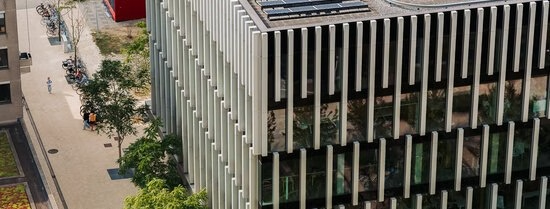The Community for Learning & Innovation (CLI) is convinced that realising innovation projects demands an ongoing conversation between stakeholders, in particular between the innovators among lecturers, students and professional supporters.
The CLI has embedded the conversation in multiple network events and three different kinds of communities in which the exchange of ideas is coupled with developing practical proposals: (1) the communities of practice, (2) the community of Learning & Innovation consultants, and (3) the community of Students-for-Students (S4S).
1. Communities of Practice
In 2020, CLI and Academic Affairs joined hands in establishing communities of practice (CoPs) dedicated to three major themes in Strategy2024: Personal and Professional Development of students, Innovation Capacity of lecturers and Personalised and Online Learning[1]. The major aim of each CoP is to facilitate exchange between the Schools that are working on innovation projects concerned with realising the strategic themes. The community critically reflects on plans for educational innovation and the ways in which these are put into practice.
In addition, the CoPs aim to contribute to mid- and end-term evaluation of the projects in the Schools. Each community consists of lecturers and professional supporters from different Schools and is led by an Academic Lead, who is a senior staff member with experience in the community’s topic. The academic lead collaborates closely with a vice-dean of education, academic director or sponsor in realising the goals of the CoP.
Personal and Professional Development of Students
| Academic lead | Jamie van der Klaauw (ESPhil) |
| Vice-dean | prof.dr. Liesbeth Noordegraaf-Eelens (ESPhil) |
The Community Personal and Professional Development (CPPD) is a community of higher educational professionals who engage in a collective, ongoing reflective enquiry.
This community focuses on the strategic goal of educating students aimed at:
- giving students skills to develop self-awareness to become who they are or who they want to be (reflection)
- giving students tools to develop personal professional identities (i.e., knowledge, skills, values and ways of being) (action).
The continuous learning of staff in the CPPD in terms of students’ personal and professional development should result in improved quality of education so that development of students’ personal professional identities is embedded throughout the BA- and MA- curriculum. Therefore, CPPD moves from (predictors of) study success to student success in and beyond university.
Schools and university-wide programmes (e.g. student well-being and Impact at the Core) execute (innovation) projects concerned with skills education and job orientation. CPPD’s agenda includes the overarching issues that occur in all Schools. For example, how do we train students to reflect on their acquisition of personal and professional skills and what instruments do we need to engage students in critical reflection upon their personal professional identity development?
Innovation Capacity of Lecturers
| Academic lead | drs. Remy Fermont (CLI/Risbo) |
| Academic director | prof.dr. Jeroen Jansz (CLI) |
The Community Innovation Capacity of Lecturers (CIC) aims to explore, implement and evaluate ways for boosting the innovation capacity of lecturers.
The aim is to make lecturers key players in realising the strategic goals with respect to future oriented education. The CIC develops proposals on how to further unbundle the tasks of lecturers. Unbundling is facilitated by the network of L&I consultants in the Schools and the support offered by the CLI, but it also includes the application of technical solutions.
The CIC particularly focuses on the specification of the kind of support lecturers need in different stages of teaching (from design to assessment) and during different phases in their teaching careers. Finally, the CIC invests in supporting lecturers to become inspirational leaders who can engage their fellow-lecturers and professional supporters in future oriented education.
Personalised and Online Learning
| Academic lead | Mirjam van de Woerdt (CLI) |
| Academic sponsor | dr. Björn de Koning |
The Community Personalised and Online Learning (CPOL) is concerned with developing personalised kinds of education with a focus on how digital technology can contribute to personalisation.
The faculty plans that aim to enhance online learning generally employ a blended format. The COVID-19 pandemic accelerated the development of online education. The CPOL critically monitors which online learning instrumentation will make academic education more engaging. The community also invests in improving online assessment asking, for example, how to develop scalable digital forms of feedback and formal assessment.
2. Learning & Innovation consultants
The community is composed of L&I consultants and other professional supporters who are employed by the different Schools, Professional Services or the CLI. It meets regularly and combines the generation of innovative ideas with hands-on responses to challenges in actual teaching.
3. Students-for-Students (S4S)
The community of Students-for-Students (S4S) is run by students, while the CLI provides the resources. S4S stimulates and facilitates projects proposed by teams of students that aim to contribute to improving the quality of education within as well as adjacent to the official curriculum.
More information
Contact the Community for Learning & Innovation for more information.
- Email address
- cli@eur.nl
[1] Personal and Professional Development of Students, Innovation Capacity of Lecturers and Personalised Online Learning are concerned with strategy projects in the Schools. Next to it there are three strategic projects operating at the central level of EUR: Student Wellbeing, Impact at the Core and ErasmusX.
